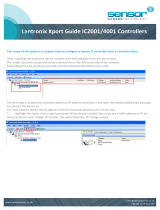
Page 8
- In the right hand window move the slider down and until you see the ‘Network’
settings
- Before proceeding you must speak to your network administrator to get the following
information regarding the network you will be connecting the XPort device to:
• The network gateway
• The network subnet
• An available IP address.
- This should ideally be a static IP address.
- The second best would be an assigned address.
- The worst best would be a leased address with a significant time
out.
- One of the above must be found. Failure to do so could result in
problems communicating with the logger in the event of a reset of
the XPort device caused by a power failure.
- When you have an IP address from your network administrator as detailed above note it
down here __.__.__.__. This will be required when setting up communications from within
SquirrelView.
- I
f the IP address given to you by your network administrator is different from the one in the
column titled ‘IP Address’ above you must perform the following additional step:
Click the address button.
In the displayed dialog type in the IP address given to you by the network administra-
tor. Then click on the button
- Next type in the network gateway and subnet values from the network administrator in the
Network section shown in the diagram above.

















